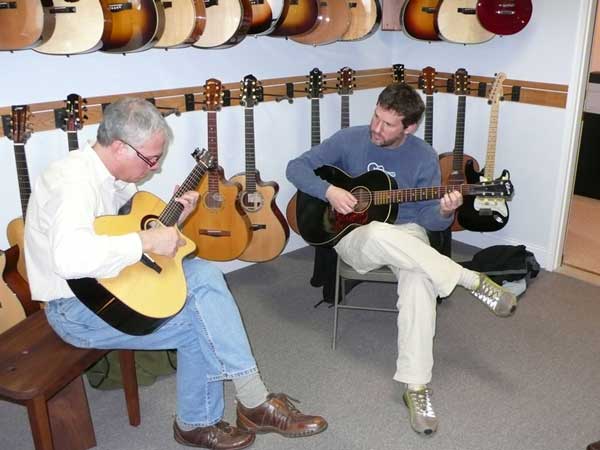Russ Barenberg (left) and Bryan Sutton: On the song 'Dark Island,' so beautiful and so winsome all at once, the two instruments trade and interlace delicate, lower strings conversations, leading to a poignantly resolved musical sigh at the end.
Close Enough, And Full of Life
By David McGee
ALMOST LIVE
Bryan Sutton and Friends
Sugar HillGive Bryan Sutton credit: he knows how to make the most of an opportunity. As soulful a guitar picker as he is a masterful one, as he's demonstrated on countless sessions for other artists, he's doubly so on his own solo outing. Generous too—note the "and Friends" billing for the august assemblage of all-universe players who serve to inspire Sutton and each other to greater heights of feeling and nuanced playing in sessions Sutton the producer designed to be free-flowing and spontaneous.
With Sutton it's about something more than the fluid, precise noting and exciting harmonic choices he makes when cutting out on a solo run or injecting a scintillating, atmospheric fill at the precise moment it's needed to heighten a song's drama, be it dark or light. It can't be quantified, because it's about soul, something deep inside him that bespeaks a warm, giving humanity, and flows through his fingertips onto the fretboard. There's a good reason why his credit appears on so many memorable recordings. You hear it here most affectingly on the gentle, rolling, reflective guitar duet with Russ Barenberg, "Dark Island," so beautiful and so winsome all at once, with the two instruments trading and interlacing delicate, lower strings conversations, leading to a poignantly resolved musical sigh at the end. You hear it in the abundance of life informing the careening, exuberant dialogues between Sutton's guitar, Tim O'Brien's mandolin, and Stuart Duncan's fiddle, over the steady pulse of Dennis Crouch's bass, in Sutton's own delightful frolic, "Wonder Valley Gals."
Musical compadres Chris Thile and Bryan Sutton perform 'Raining at Sunset' at the Woodsongs Old Time Radio Hour (note: this song is not on Sutton's Almost Live album)
It should be evident by now that the credited "Friends" are quite the player themselves. In addition to the above-named, others on board represent the best of multiple generations—Sam Bush, Jerry Douglas, Bela Fleck, Aubrey Haynie, Pete Wernick, Jeff Taylor, Nick Forster, Mark Schatz and, in essence, the Punch Brothers—Sutton's old buddy Chris Thile, Greg Garrison, Noam Pikelny, Gabe Witcher, whose roster Sutton was on back in the How to Grow a Band, proto-Punch Brothers days. The Punchers team up with Sutton on the second cut, the wide open, rambling strut titled "Big Island Hornpipe." Credited to Thile and Sutton together, the instrumental sprints along free and easy on a winding road of solos by each instrumentalist, one following the other in an eager dialogue—Thile's mandolin excursions tend toward the lyrical and impressionistic, and banjoist Pikelny picks up that vibe when he joins the conversation, but it's Sutton's fleet trots up and down the guitar neck that set the fluid pace, as fiddler Witcher provides the expository link between soloists' exits and entrances. It's the closest thing we'll have to a new Punch Brothers tune until next year, and it's an unalloyed delight of uplifting, spirited playing.
Fleck and Sutton team up for an instrumental duet on their co-written mini-opus, "Rye Straw Suite," four minutes and 50 seconds of discursive theme and development by these two masters, ranging across a textural field of bristling high energy and soothing, contemplative soloing and ensemble dialogue. In the matter of high energy and high spirits, it doesn't get any cooler than "Le Pont De La Moustache," a rollicking Hot Jazz-style workout redolent of Django's Paris, with Sutton's Rheinhardt-style speed-picked guitar complemented by Haynie's equally flamboyant fiddling, with Jeff Taylor spicing the ambiance with frisky retorts up and down the accordion keys.
It's true that most of the dramatic personae here are best known for their instrumental prowess, but Almost Live is not without the blessing of the human voice. Tim O'Brien (mandolin) is on board with Pete Wernick (banjo), Nick Forster (bass) and Sutton to offer up a genial, loping treatment of Norman Blake's wonderful "Church Street Blues," his warm tenor as warm and welcoming as old friends. Sutton himself breaks out his rarely heard personable tenor voice to close out the album in a duet with a soaring Thile on the Delmore Brothers' "Gonna Lay Down My Old Guitar," which is exceptionally executed instrumentally, with both parties taking off on astonishing, impossibly fleet and cleverly serpentine solo sorties before engaging each other in a bit of instrumental double-talk—that is, each one shadowing and answering the other's jittery themes—that is downright mind boggling. The two men's voice complement each other beautifully, with Thile's lighter, keening harmonies providing the lift while Sutton's deeper tone provides the ballast. Gotta admit this is a rather ironic ending, though, in that the idea of Bryan Sutton laying down his old guitar is pretty far-fetched, and would be met with howls of protest. In fact, word is rampant of healthcare reform being shelved in favor of the enactment of Federal legislation to prevent Sutton from ever hanging it up. Finally, bipartisanship we can believe in!
Founder/Publisher/Editor: David McGee
Contributing Editors: Billy Altman, Laura Fissinger, Christopher Hill, Derk Richardson
Logo Design: John Mendelsohn (www.johnmendelsohn.com)
Website Design: Kieran McGee (www.kieranmcgee.com)
Staff Photographers: Audrey Harrod (Louisville, KY; www.flickr.com/audreyharrod), Alicia Zappier (New York)
E-mail: thebluegrassspecial@gmail.com
Mailing Address: David McGee, 201 W. 85 St.—5B, New York, NY 10024


